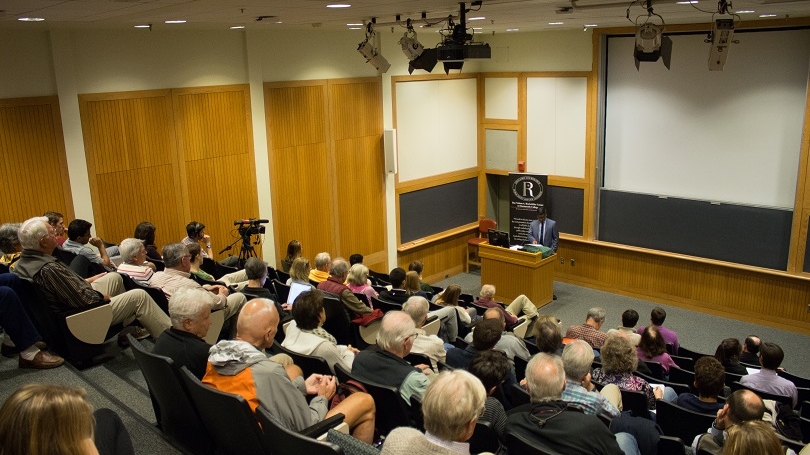
- Public Policy
- Leadership
- Funding
- News & Events
- About the Center
Back to Top Nav
Back to Top Nav
Back to Top Nav
Back to Top Nav
On Wednesday, October 3rd, Ramesh Ponnuru, a senior editor at the National Review and visiting fellow at the American Enterprise Institute, reflected on the influence of character in politics to a packed audience at the Nelson A. Rockefeller Center for Public Policy.
“I’m going to remember to turn off my phone in case the President texts me again,” he mused before launching into speech on the importance of a politician’s integrity, as well as their character flaws. “To what extent does the character of a public servant matter?” he asked the audience.
Mr. Ponnuru reflected that he has watched the two parties flip their position on politicians’ character. Over the past few years, conservatives have seemed to find a new sense of realism when assessing public servants. While on the left, “there is a new and real sensitivity to character flaws” notably since the #MeToo movement.
Mr. Ponnuru recalled that the founding fathers predicted “enlightened statesmen will not always be at the helm,” when discussing the “widespread and deep criticism” of President Trump’s character. He also argued that when looking at America’s history, it was nothing new to elect a president with serious character flaws. He noted that if the country looked at the presidency as a job for which we hire a person instead of a moral office meant to inform our own character, President Trump might have a higher approval rating.
He acknowledged that the criticism of the president’s character was warranted, but was quick to compare Trump’s character flaws to former President Bill Clinton’s. In the midst of recounting Trump’s flaws, including then-candidate Trump’s mockery of a disabled reporter, Mr. Ponnuru paused to remind the audience that “Clinton’s relationship with truth, like many of his other relationships, was casual.” While during the question and answer session he clarified that he was not equating President Clinton’s actions with those of President Trump, Mr. Ponnuru noted that he believes more Democrats today find Clinton’s use of power no longer defensible.
However, when reflecting on President Trump himself, Mr. Ponnuru warned “credibility is easy to loose and hard to gain.” He believes many voters elected Trump in spite of his character flaws, not because of them.
During an interview earlier that afternoon, Mr. Ponnuru discussed the necessary adaptation of society’s expectations toward character due to the advent of social media. “I think that the generational shift in the use of technology is, of course, going to have major consequences for how we process questions of political scandal. On the one hand, it will create more material for people to go through and sometimes to exploit. On the other hand, the frame of reference will shift.” Things that were once considered “extremely weird to people” at one time may become increasingly normalized.
“I think there are objective moral wrongs,” Mr. Ponnuru stated when speaking about a definitive line past which a politician should lose their job. “However, our assessment of an individual has to take account of the social context.”
Written by Lauren Bishop ’19, Rockefeller Center Student Program Assistant for Public Programs
The views and opinions expressed, and any materials presented during a public program are the speaker’s own and do not necessarily represent the views and opinions of the Rockefeller Center or constitute an endorsement by the Center.